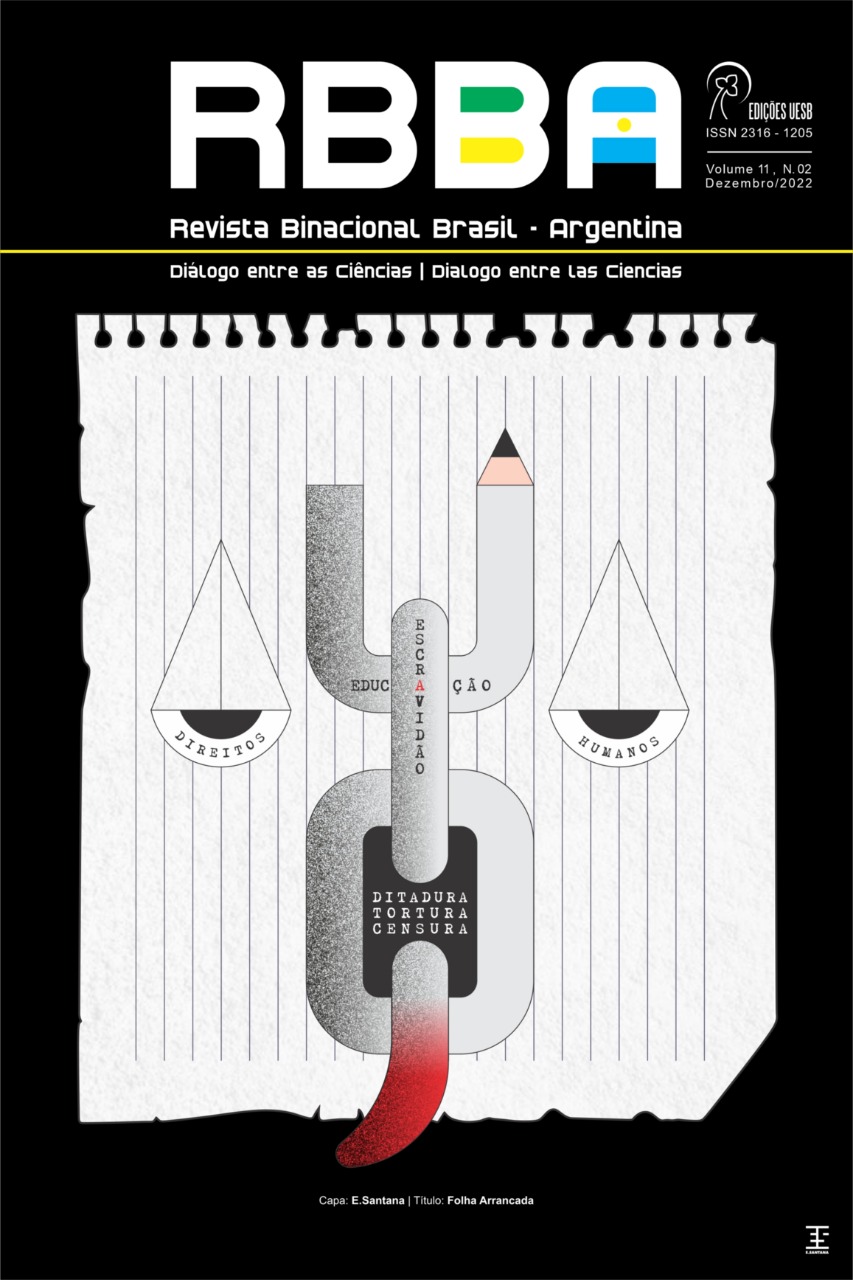“WHO IS BORN IN BACURAU AND WHAT? IT'S PEOPLE”: ANALYSIS OF THE EFFECTIVENESS OF FUNDAMENTAL RIGHTS FROM THE FILM BACURAU
DOI:
https://doi.org/10.22481/rbba.v11i02.11249Keywords:
Bacurau, Law and cinema, Fundamental rights, Democratic stateAbstract
This work, which is inserted in the field of interdisciplinary studies between law, literature and cinema, aims to analyze the effectiveness (or not) of fundamental rights in Brazil, after the 1988 Constitution, through the cinematographic work Bacurau. The film work, although it temporally situates the events in the future Brazil, raises many questions that, unfortunately, are already present in the current sociopolitical context. To do so, it starts from the perspective of law in literature to study, through the film, violations of fundamental rights. In this way, this work discusses, at first, the film, its representations of reality and how it allows us to reflect on the effectiveness of fundamental rights. A brief study is carried out on fundamental rights, their evolution, objective and normative contextualization in Brazil. In order to, finally, analyze the effectiveness of fundamental rights in Brazil. In this way, it allows us to conclude that fundamental rights are weakened given the condition of an absent, negative State, which lacks good financial management to provide the effectiveness of fundamental rights.
Downloads
References
ABBOUD, G.; CARNIO, H.G.; OLIVEIRA, R.T. Introdução à teoria e à filosofia do direito. -3. ed. rev., atual. e ampl. – São Paulo: Editora Revista dos Tribunais, 2015.
BACURAU. Direção de Kleber Mendonça Filho e Juliano Dornelles. Brasil, França: Ancine, Arte France Cinéma, CNC, CinemaScópio, Globo Filmes, Globosat/Telecine, SBS, Síbio Filmes, 2019 (131 min.).
BOBBIO, Norberto. A era dos direitos. Tradução Carlos Nelson Coutinho. – Nova ed. — Rio de Janeiro: Elsevier, 2004.
BONAVIDES, Paulo. A quinta geração de direitos fundamentais. Revista Brasileira de Direitos Fundamentais & Justiça, nº 3, abril/junho, 2008.
BRUNER, Jerome. Fabricando histórias: direito, literatura, vida. São Paulo: Letra e Voz, 2014.
CASTILLO, Monica. Bacurau. Roger Ebert.com, 6 de março de 2020. Disponível em: Acesso em: https://www.rogerebert.com/reviews/bacurau-movie-review-2020. 20 dez. 2021.
COELHO, Claudio Carneiro B. P. Teoria do pêndulo econômico-hermenêutico: uma releitura da relação entre estado, direito e sociedade em tempos de (pós) crise. 1. ed.– Rio de Janeiro: University Institute Editora, 2021.
DA SILVA, Virgílio Afonso. A evolução dos direitos fundamentais. Revista Latino-Americana de Estudos Constitucionais, 2005, p. 541-558.
DE CHUEIRI, Vera Karam; E SILVA, Ana Cláudia Milani. Sobre a surpresa e o apocalipse em Bacurau. ANAMORPHOSIS – Revista Internacional de Direito e Literatura, v. 6, n. 2, julho-dezembro 2020.
HÄBERLE, Peter. Dimensões dos Direitos Fundamentais à Luz de uma Comparação de Níveis Textuais de Constituições. Direito Público, v. 11, n. 55, p. 193-119, 2014.
IMMANUEL, Kant. Fundamentos da metafísica dos costumes. São Paulo: Ediouro, 1997.
KARAM, Henriete. Questões teóricas e metodológicas do direito na literatura: um percurso analítico-interpretativo a partir do conto Suje-se gordo! de Machado de Assis. Revista Direito GV, São Paulo, v. 13, n. 3, 27-865, Set-Dez 2017.
MENDONÇA FILHO, Kleber. “Bacurau” é sobre o meu êxtase em ir ao cinema. Entrevista por Bruna Bitencourt. Revista Trip, 16 de agosto de 2019a. Disponível em: https://revistatrip. uol.com.br/trip/entrevista-com-kleber-mendonca-filho-fala-sobre-bacurau. Acesso em: 15 dez. 2021
MENDONÇA FILHO, Kleber; DORNELLES, Juliano; PEREIRA, Silvero; TELES, Karine; COLEN, Bárbara; AQUINO, Thomás. “Bacurau” retrata contradições em faroeste no sertão com crítica à cultura de armas, diz diretor. Entrevista por Cesar Soto. G1, 29 de agosto de 2019b. Disponível em: https://g1.globo.com/pop-arte/cinema/noticia/2019/08/29/bacurau-retrata-contradicoes-em-faroeste-no-sertao-com-critica-a-/cultura-de-armas-diz-diretor.ghtml. Acesso em: 15 dez. 2021.
NUNES, Jorge Amaury Maia. Princípios Constitucionais: Interpretação Visando à Efetividade. Direito Público, v. 5, n. 19, 2008.
NUNES, Rodrigo Guimarães. “Bacurau” não é sobre o presente, mas o futuro. El País, 06 de outubro de 2019. Disponível em: https://brasil.elpais.com/brasil/2019/10/05/cultura/ 1570306373_739263.html Acesso em: 16 dez. 2021.
OLIVEIRA, Joana. Em “Bacurau”, é lutar ou morrer no sertão que espelha o Brasil. El País, 21 de agosto de 2019. Disponível em: https://brasil.elpais.com/brasil/2019/08/20/cultura/ 1566328403_365611.html. Acesso em: 18 dez. 2021.
TRINDADE, André Karam; MORAIS, Fausto Santos; BRUM, Marcelo Barbosa. Direito, escravidão e literatura: reflexões acerca da (in) efetividade dos direitos fundamentais a partir do conto “Negrinha”, de Monteiro Lobato. Revista Brasileira de Direito, v. 7, n. 1, p. 147-166, 2011.
SARLET, Ingo Wolfgang. Dignidade da pessoa humana e direitos fundamentais na Constituição Federal de 1988. – 9. ed. rev. atual. – Porto Alegre: Livraria do Advogado Editora, 2011.
SEGUNDO, Elpídio Paiva Luz. Machado de Assis ensinando direito das sucessões: o conto “Verba testamentária”. ANAMORPHOSIS – Revista Internacional de Direito e Literatura v. 7, n. 1, janeiro--junho 2021.
TASSINARI, Clarissa; LIMA, Danilo Pereira. A problemática da inefetividade constitucional no brasil: o estado patrimonialista e o ativismo judicial. Revista da Academia Brasileira de Direito Constitucional, Curitiba, 2011, vol. 3, n. 4, Jan-Jun. p. 98-113.
Downloads
Published
How to Cite
Issue
Section
License
Copyright (c) 2022 Revista Binacional Brasil-Argentina: Dialogue between the sciences

This work is licensed under a Creative Commons Attribution 4.0 International License.






